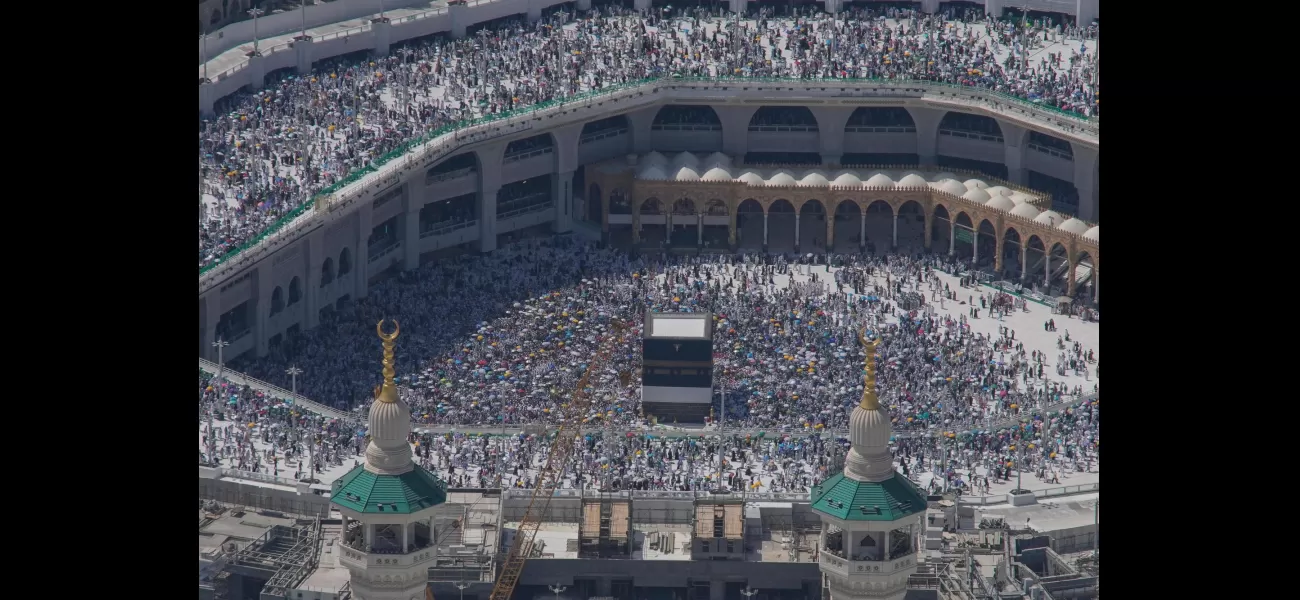More than 1,300 people lost their lives during the annual Hajj pilgrimage in Saudi Arabia, according to officials.
Over 1000 died during Hajj pilgrimage in Saudi Arabia due to extreme heat at holy sites, officials report.
June 23rd 2024.

The Hajj pilgrimage in Saudi Arabia this year was met with tragedy as more than 1,300 people lost their lives due to extreme high temperatures. The Saudi Health Minister, Fahd bin Abdurrahman Al-Jalajel, shared the devastating news on Sunday, revealing that 83% of the fatalities were unauthorized pilgrims who endured long distances in the scorching heat to perform the Hajj rituals in and around the holy city of Mecca.
During a state-owned television interview, the minister expressed his concern for the 95 pilgrims who were currently receiving treatment in hospitals, with some being airlifted to the capital, Riyadh. He also mentioned the difficulty in identifying the deceased, as many of them did not have any form of identification on them.
Among the casualties were over 660 Egyptians, with only 31 of them being authorized pilgrims. Egyptian officials have confirmed that the licenses of 16 travel agencies have been revoked for assisting unauthorized pilgrims to travel to Saudi Arabia. These agencies are now under investigation by the public prosecutor.
Despite the Saudi authorities' efforts to crack down on unauthorized pilgrims, many, mostly Egyptians, still managed to reach holy sites in and around Mecca, some even on foot. Unlike authorized pilgrims who had access to hotels to escape the intense heat, these pilgrims were left to brave the scorching temperatures.
The Egyptian government released a statement on Saturday, revealing that these travel agencies had sold Saudi tourist visas to Egyptian pilgrims, violating the regulations that require exclusive visas for pilgrims. As a result, many pilgrims were left stranded in Mecca and the holy sites, enduring extreme temperatures and harsh conditions.
The casualties also included pilgrims from Indonesia, India, Jordan, Tunisia, Morocco, Algeria, and Malaysia, with two U.S. citizens also reported dead. While the exact cause of death has not been confirmed, some countries have attributed it to the soaring heat. Journalists on the scene witnessed pilgrims fainting, vomiting, and collapsing due to the extreme temperatures.
Unfortunately, deaths are not uncommon during the Hajj, which sees over 2 million people travel to Saudi Arabia for a five-day pilgrimage. However, this year's death toll was exceptionally high, suggesting that there were unusual circumstances at play.
In 2015, a stampede in Mina claimed the lives of over 2,400 pilgrims, making it the deadliest incident in the history of the Hajj. Saudi Arabia has never officially acknowledged the full toll of the stampede. That same year, a crane collapse at Mecca's Grand Mosque killed 111 people.
The second-deadliest incident at the Hajj was a stampede in 1990 that claimed 1,426 lives. Despite the Saudi government investing billions of dollars in crowd control and safety measures, the sheer number of participants makes it challenging to ensure everyone's safety.
Climate change is also a growing concern for the Hajj pilgrimage. A 2019 study by experts at the Massachusetts Institute of Technology warned that even with successful efforts to mitigate climate change, the Hajj would still be held in temperatures exceeding the "extreme danger threshold" for several years in the future.
The Hajj is one of the five pillars of Islam and is considered one of the largest religious gatherings in the world. In 2024, over 1.83 million Muslims performed the Hajj, with the majority coming from 22 different countries. While Saudi citizens and residents also participated, their numbers were significantly lower, with only around 222,000 taking part in the pilgrimage.
As the Islamic calendar follows a lunar cycle, the date of the Hajj changes each year, with the pilgrimage occurring around 11 days earlier than the previous year. It is predicted that by 2029, the Hajj will take place in April, and for several years after that, it will fall in the winter, when temperatures are milder. Despite this, the risk of extreme temperatures and other challenges during the Hajj remains a growing concern.
During a state-owned television interview, the minister expressed his concern for the 95 pilgrims who were currently receiving treatment in hospitals, with some being airlifted to the capital, Riyadh. He also mentioned the difficulty in identifying the deceased, as many of them did not have any form of identification on them.
Among the casualties were over 660 Egyptians, with only 31 of them being authorized pilgrims. Egyptian officials have confirmed that the licenses of 16 travel agencies have been revoked for assisting unauthorized pilgrims to travel to Saudi Arabia. These agencies are now under investigation by the public prosecutor.
Despite the Saudi authorities' efforts to crack down on unauthorized pilgrims, many, mostly Egyptians, still managed to reach holy sites in and around Mecca, some even on foot. Unlike authorized pilgrims who had access to hotels to escape the intense heat, these pilgrims were left to brave the scorching temperatures.
The Egyptian government released a statement on Saturday, revealing that these travel agencies had sold Saudi tourist visas to Egyptian pilgrims, violating the regulations that require exclusive visas for pilgrims. As a result, many pilgrims were left stranded in Mecca and the holy sites, enduring extreme temperatures and harsh conditions.
The casualties also included pilgrims from Indonesia, India, Jordan, Tunisia, Morocco, Algeria, and Malaysia, with two U.S. citizens also reported dead. While the exact cause of death has not been confirmed, some countries have attributed it to the soaring heat. Journalists on the scene witnessed pilgrims fainting, vomiting, and collapsing due to the extreme temperatures.
Unfortunately, deaths are not uncommon during the Hajj, which sees over 2 million people travel to Saudi Arabia for a five-day pilgrimage. However, this year's death toll was exceptionally high, suggesting that there were unusual circumstances at play.
In 2015, a stampede in Mina claimed the lives of over 2,400 pilgrims, making it the deadliest incident in the history of the Hajj. Saudi Arabia has never officially acknowledged the full toll of the stampede. That same year, a crane collapse at Mecca's Grand Mosque killed 111 people.
The second-deadliest incident at the Hajj was a stampede in 1990 that claimed 1,426 lives. Despite the Saudi government investing billions of dollars in crowd control and safety measures, the sheer number of participants makes it challenging to ensure everyone's safety.
Climate change is also a growing concern for the Hajj pilgrimage. A 2019 study by experts at the Massachusetts Institute of Technology warned that even with successful efforts to mitigate climate change, the Hajj would still be held in temperatures exceeding the "extreme danger threshold" for several years in the future.
The Hajj is one of the five pillars of Islam and is considered one of the largest religious gatherings in the world. In 2024, over 1.83 million Muslims performed the Hajj, with the majority coming from 22 different countries. While Saudi citizens and residents also participated, their numbers were significantly lower, with only around 222,000 taking part in the pilgrimage.
As the Islamic calendar follows a lunar cycle, the date of the Hajj changes each year, with the pilgrimage occurring around 11 days earlier than the previous year. It is predicted that by 2029, the Hajj will take place in April, and for several years after that, it will fall in the winter, when temperatures are milder. Despite this, the risk of extreme temperatures and other challenges during the Hajj remains a growing concern.
[This article has been trending online recently and has been generated with AI. Your feed is customized.]
[Generative AI is experimental.]
0
0
Submit Comment





